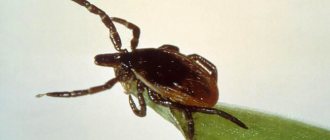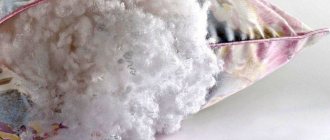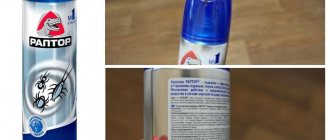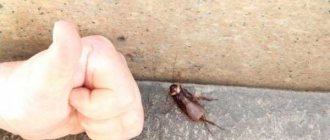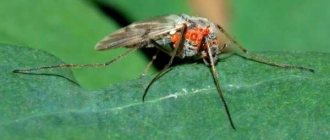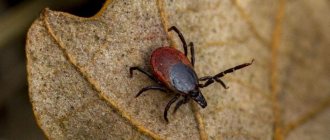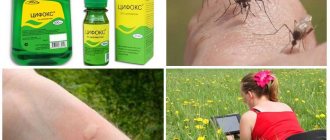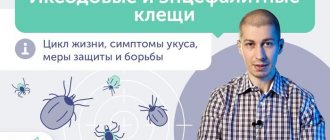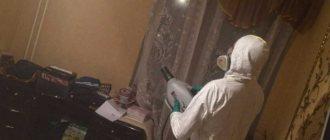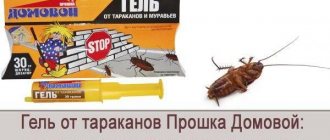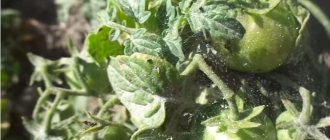Dangerous pigeon mite. Appearance of the parasite and habitat. Life cycle and stages of development. Carriers of dangerous diseases. Danger from a parasite bite. Infection of apartments. How to get rid of parasites in an apartment. Tips and tricks.
A person is surrounded by a large number of blood-sucking insects, which, although they belong to species that parasitize animals and birds, also attack people. These parasites include the pigeon mite, which, despite its name, parasitizes other species of birds. Such bird parasites can easily adapt to living conditions, which poses a great danger to humans.
Development cycle
- Mature females lay eggs in birds' nests or in their excrement.
- The larvae are very pale caterpillar-like individuals; the favorable period for development is summer.
- The full cycle from egg laying to the emergence of the larvae ranges from 20 to 25 days, under favorable development conditions.
- During the cold season, fleas and already laid eggs fall into suspended animation and can remain in it for a long period of time.
Important. Pigeon fleas lead an active lifestyle only during the period when the birds are sitting in the nest. At this time, parasites mercilessly bite both adult birds and young offspring. When birds leave the nests and fly to warmer regions, the fleas turn into pupae and remain in the nests until the birds return.
general description
If we talk about the external characteristics of the parasite, they are very similar to ordinary ticks. The pigeon mite has a smaller body size; adult individuals reach 4-10 mm. Also different is the color of the insect; there is a bright stripe on the body, and depending on the saturation, they change color, which can go from light brown to bright scarlet. You can see how they look in the photo.
Most often, parasites are carried and spread to new territories by pigeons. This is due to the fact that pigeons often visit landfills and do not really take care of the cleanliness of their feathers. Different types of parasites collect on feathers, including pigeon mites. These insects do not parasitize on the body of birds, but attack them only for saturation, this happens at night, during the day they hide in secluded corners of pigeon coops.
In order for a female to lay eggs, she must be saturated with blood. After saturation, she is ready to lay eggs, leaving the body of her victim, she finds a place in the nest and lays offspring. The eggs hatch into larvae, which already at this stage require nutrition. They feed on the blood of small chicks.
Unfortunately, these bloodsucking birds are not limited to attacking pigeons and other birds. If they find themselves in conditions where there is no usual victim nearby, they can attack other animals and even people, which is very dangerous.
Why are fleas on pigeons dangerous for humans?
Bird fleas feed on blood; in the absence of birds for a long time, they begin to bite humans. These parasites can settle in a house or apartment and live for a long period of time without visible signs. Pigeon parasite bites can be recognized by the following symptoms:
- Severe pain in the bite area.
- Damage to the skin does not heal for a long time, sometimes turning from a simple wound into suppuration with a bluish tint.
- Immediately after the bites occur, allergies are observed in the form of:
- Elevated temperature;
- Severe itching;
- Chills and fever;
- Inflammation of the lymph nodes.
Pigeon fleas can act as carriers of various infections and diseases , such as:
- Typhoid
- Hepatitis
- Encephalitis
- brucellosis
Therefore, it is highly recommended not to self-medicate , especially if acute allergy symptoms appear on the body immediately after the bites. This may indicate the development of a dangerous disease and if treatment is not started in time, the consequences can be disastrous.
Life cycle
The life cycle of the parasite includes 5 stages of development:
- Egg. As mentioned earlier, the female lays eggs only if the blood is completely saturated, which is necessary for the maturation of future offspring. For normal development of egg laying, a temperature of 5-30 °C is required. Ini are round in shape and very small in size, similar to small grains.
- Larva. Already at this stage of development they have limbs, although there are only three pairs of them. The oral part is still very poorly developed. They are colorless and transparent. At this stage, they do not yet need nutrition.
- Protonymph. Resembles a fully mature adult. They have 4 pairs of limbs and already need food; after one meal they move to the next stage.
- Deutonympha. At this stage of development, individuals become stronger, reach their maximum size, a chitinous coating appears, and the last setae appear. The only difference from adults is the absence of reproductive apparatus.
- Imago. Adult sexually mature individual. Females are much larger than males. Once saturated, a female can lay 30 to 80 eggs at a time.
Signs of bird infection
There are a number of signs by which you can recognize whether a bird is infected with parasites or not :
- The bird's feathers are constantly frayed, which may indicate that it is bothered by bites and itching.
- The behavior of the bird is restless and aggressive. Frequent parasite bites make the bird nervous.
- Excessive loss of down and feathers indicates an advanced stage of the disease.
Prevention measures
To maintain the health of pigeons and protect birds from pests, experienced breeders recommend taking the following measures:
- Maintain cleanliness: remove dirt and excrement, wash feeders and drinkers.
- Systematically disinfect, and if insects are detected, disinfect.
- Filling holes and cracks in the walls of your home is a favorite habitat for ticks and bedbugs.
- Provide your bird with a proper and balanced diet, including vitamins.
- Preventing pet birds from coming into contact with wild birds: Do not allow outdoor pigeons to eat or drink from pet bowls.
No one is immune from pest infestation, including domestic pigeons. The best thing a breeder can do for their pets is to eliminate the possibility of infection in advance by regularly carrying out preventative measures and measures to eliminate parasites. If the problem persists, you should contact your veterinarian, who will advise you on pest control methods.
How and where can you get infected?
Considering that flocks of pigeons live in almost every yard, both in the city and in the countryside, the risk of bringing pigeon fleas into the house is very high for every person.
There is a high risk of infection:
- Through direct contact with birds (a pigeon pecked bread from a hand, sat on its head, and so on)
- Flea larvae can be carried into the house on shoes (very often they live in bird excrement)
- During the trip , visiting caves, grottoes and places with large concentrations of birds.
- If the balcony is not glazed , when birds have free access to the balcony, they can spend a long time there, shit, nest, and so on.
What you need to know about ticks
Parasites are active only at night. The adults attack the pigeons, after which the female is ready to lay eggs. The larvae have underdeveloped mouthparts, so they can only attack chicks; their skin is much softer and it is easier for them to gnaw through it. After they chew their way through, they penetrate the skin, where they develop and move on to the next stage. One chick can be attacked by several individuals at once. With such massive attacks, the pigeons suffer greatly and may stop developing and die.
Regardless of what stage of development an individual is at, it poses a great danger to humans. The risk of contracting these parasites is actually quite high, even if you do not keep or be near a dovecote.
When pigeons fly, they spread parasites. This way a blood-sucking insect can land on a person or on the territory from which the tick gets on him. It is also worth considering that these parasites can go without food in the nymph stage for 3 years. Regarding the danger to humans, it is the larvae that pose the greatest danger. Because once they get on the human body, they can parasitize on it for a week. When attacked by an adult, one hour will be enough to get enough and fall off on its own.
How to treat birds
Specialized pet stores offer a wide selection of products for feathered friends, the action of which is aimed at destroying parasites. Manufacturers offer different forms of preparations: you can spray the product as an aerosol, you can rub it into feathers , it all depends on the preferences of the buyer.
After treating birds, it is imperative to treat the latter’s habitat . This is done in order to avoid re-infection of birds.
The person handling the birds and cages must wear gloves, a cap and protective outerwear. Upon completion of the procedure, the person must wash his outer clothing and take a shower.
Fighting ticks in the apartment
- The likelihood that an apartment will be infested with pigeon mites is quite high, especially if there are bird nesting areas nearby. It is not difficult to detect them at the initial stage of infection. Although this is a small parasite, a person can easily see it. In addition, their bites will not go unnoticed.
- Getting rid of these bloodsucking creatures can be very difficult. Measures must be taken as soon as an infestation is noticed. They reproduce very quickly, and if they are given time, the fight will be a very difficult, long, and labor-intensive process.
- To combat them, it is necessary to use specialized means. Treatment of apartments must be carried out in accordance with the instructions for use and compliance with safety measures. With a high degree of infestation, it is most often necessary to remove floor coverings, linoleum, and wallpaper.
- If the infection occurs from birds that live in the attics of your home, then you will definitely need to treat this room to prevent re-infestations.
Pigeon fleas in an apartment: how to get rid of them
The room is treated with any insecticidal agent according to the instructions. During the period of action of the drug, the room must be left for a day. Then, upon returning, you should ventilate the room and do a wet cleaning. All surfaces are wiped with a soda solution.
In hard-to-reach places, you can leave some of the product for prevention. To obtain the expected effect, the treatment procedure will need to be repeated 10 - 14 days after the first one .
If there are fleas from pigeons on the balcony, then it also needs to be treated and glazed over time or periodically treated for preventive purposes.
If the apartment is on the top floor, and pigeons have settled on the roof, then you need to remove them from the roof and attic without causing harm to the birds. Then thoroughly treat their habitats and only after that begin disinfection in the apartment.
All types of parasites cannot tolerate the smell of wormwood; as a preventative measure, you can apply a few drops of wormwood essential oil to your shoes and clothes , and calmly go to feed the pigeons or travel through a cave.
How to deal with pigeon parasites
When treating pigeons for blood-sucking insects, it is important not to forget about disinfecting the poultry house, which can be done with repellents and insecticides “Raptor”, “Dichlorvos” and “Kombat”. The following remedies can get rid of pigeon parasites:
- To eliminate feather eaters, bird feathers are wiped with a cotton swab dipped in denatured alcohol. The treatment is repeated until the parasites are completely eliminated.
- Frontline and Ivermek products, which are used according to the instructions, are good for getting rid of fleas
- Scabies mites are eliminated using the drug "Chinese Dust".
- The drugs Prasifen and Levamisole 10% will help remove helminths Among folk remedies, raw pumpkin seeds and a decoction of pomegranate peel have proven themselves to be effective.
Ivermek
Chinese dust
Levamisole
The most effective drug, according to breeders, is “Antiparasite”. This is a smoke bomb that quickly destroys feather eaters, ticks, fleas, as well as flies and spiders both inside the poultry house and on the pigeons themselves. The product is harmless to poultry. To eliminate parasites, you need to set fire to the checker, place it on a metal object and leave it in the room with the pigeons overnight. The advantages of “Antiparasite” in comparison with other means are as follows:
- The active ingredients in the composition are harmless to warm-blooded birds, including chicks.
- The product is applied to all patients at once, which saves time.
- Convenient way to use.
- Destroys parasites overnight.
Preventive actions
In addition to the fact that pigeons can cause infection with dangerous ticks, these birds also pose another danger to humans. The fact is that their droppings are an ideal environment for the proliferation of bacteria and infections. Therefore, it is highly undesirable to contact them.
If pigeons live in the attic of your house, you should protect your premises as much as possible from the penetration of ticks and other parasites. Seal all cracks and cracks, regularly carry out preventive treatment of the room with special means.
Most often, young children and elderly people are attacked by parasites, because they simply do not notice the insect on them. You should be as careful as possible and minimize contact with birds.
Prevention of parasites
The pigeons themselves pose a much more serious danger. Their droppings are an excellent breeding ground for many pathogenic bacteria and insects. Pigeons are carriers of salmonellosis, which is very dangerous for humans. Young children and the elderly are especially susceptible to tick attacks and may simply not notice them.
If pigeons are nesting in the attic of your home, you must urgently seal all cracks, crevices in windows and walls, if any. Treat the apartment with special products (sold in hardware stores). In some cases, residential repairs may be required.
Try to have as little contact with wild pigeons as possible, do not feed them, and protect children from close contact with birds. The less you interact with birds, the less likely you are to catch ticks.
It is also useful to read: Acaricidal treatment for ticks
Preventive actions
To prevent pigeon fleas from entering an apartment through windows and ventilation, you can use special gels. The product is applied around the perimeter and repels insects. You can purchase such gels at a pet store or veterinary pharmacy.
There is also a large selection of electronic bird scarers on sale. But this method is not always effective. In city conditions, pigeons quickly adapt to innovations and stop reacting to stimuli.
In order to protect clothes and shoes from fleas, you can use wormwood essential oil. Its smell effectively repels insects. The house can also be treated with this effective remedy. Not only essential oil is used, but also fresh or dried herbs.
The danger of pigeons for pets
For animals, the harm from pigeons is no less than for people. Nature has decreed that infections are not particularly scary for the “Sisars” themselves; they may not get sick, but they can easily infect the entire population of the poultry farm.
Just one flock of 100 pigeons produces more than 2 tons of excrement per year. It is human waste that poses the main danger to people, animals and buildings. On average, about 7 million pigeons live in a metropolis, so the amount of litter is simply gigantic. And all this settles on roofs, parapets, roads and other surfaces.
How do they look
Biologists count thousands of varieties of pigeon fleas. However, these differences are not visible to the naked eye. Parasites are characterized by the following features:
- Dark uniform color.
- Size from 1 to 3 mm.
- On the head there are processes resembling antennae.
- Elongated body shape.
- Three pairs of legs. The third is especially developed. Due to this, the flea can jump long distances.
- There are no wings.
Most often, owners of pigeons encounter fleas.
